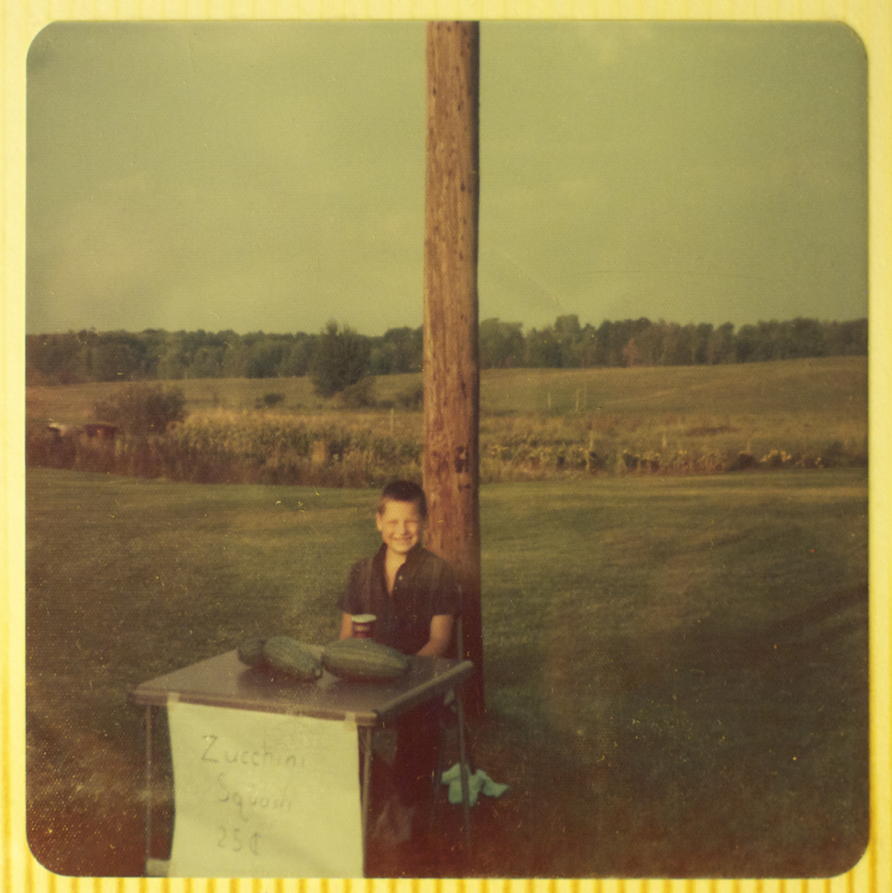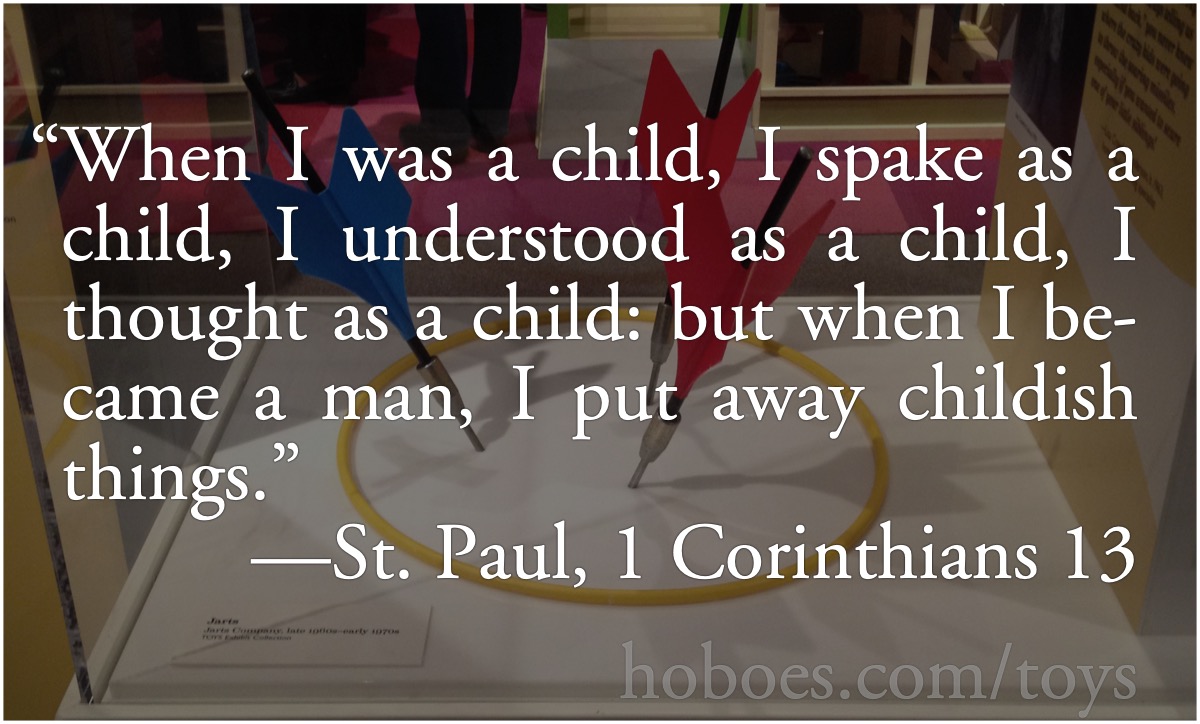What children don’t do, adults don’t know

Me at ten, waiting for the cops to arrive. Either those zucchini squash are huge, or I’m small.
Over at the Ace of Spades HQ, Ace is having deep thoughts about how, more and more, we assume that we need permission from the government to do anything. Not just that we actually need permission, which is more and more true, but that we just automatically assume that we do—and what that means, which is that more and more we innovate less.
I grew up on the East Coast. For a while, I lived in California.
I was blown away to learn that people could just start bonfires on the beach, whenever they liked.
Then I started to think like this: What kind of a mind-screw did they do on me when I should be surprised that people would be allowed to do this?
You see what I mean? My default mental state, thanks to the more statist area I grew up in (at least as far as bonfires) was that of course I wasn’t permitted by The State to build a bonfire and enjoy it.
And this is where I begin to get angry:
How much of each of our current mental landscapes are shaped by government such that we internalize the idea that the basic right to be left alone doesn’t exist?
I had a similar conversation recently with a friend about whether something should be legal or illegal. She wanted the government to just stay out of it, but could not comprehend that this meant it would be legal. “Legal” to her meant that the government approves of it, not that the government stays out of it and it was impossible to get the dictionary definition across—if the government doesn’t make it illegal, it’s legal. She didn’t want it to be illegal, and she didn’t want it to be legal, because in each case it meant that the government was involved in it.
I’ve thought about this before a lot, too, mostly in the service of free-time play. I think a large part of it has to do with discouraging, overburdening, and sometimes outright outlawing free play for kids. Things that are forbidden to children are eventually forbidden to adults, because the adults are no longer prepared to meet those situations freely.
It’s not just us as kids bringing pocket knives to school, as people talk about in the comments, although that’s a big part of it. That was responsibility: we were assumed to be responsible enough to carry knives, and they were useful things to have. We also played with chemistry sets and rocket engines and science experiment books that would freak out any modern authority figure if seen today. If we were really geeky we talked with strangers, including strange foreigners, long hours into the night on a shortwave radio. I spent hours alone programming an archaic computer simply because that’s what I wanted to do.
Along with time for free play, however, is also time and incentive for getting independent jobs. Because the flip side of all those weird things we did is that we were able to work to do them. If our parents chose not to give us the money to buy something (a radio, a computer, a rifle), we had the option of working all summer to save up our own money for the purchase. We didn’t need any permission for that. We barely even needed to fill out forms.1 I’m sure I must have filled out a form to get a paper route, but I never filled out any paperwork to mow someone’s lawn or babysit their kids or even write computer programs for computer magazines.
When I return to the small town I grew up in I don’t see kids handling the paper route, I see adults. Fewer and fewer kids signed up for it; eventually, in 2008, the Muskegon Chronicle stopped accepting anyone under 18 for their routes.
This change doesn’t just apply to the more formal jobs like getting a paper route. I don’t see kids mowing lawns for money either. And given the stories of kids being hit by governments for opening lemonade stands I’m not surprised I see fewer of them actually going into a real business using dangerous equipment.2 The jobs I do see them getting are good jobs for kids to do, but they tend to be ones where all they do is take orders; they’re not building their own business with a customer list and having to keep a record of expenses and revenues. They only initiative they’re taking is in filling out the form.
But what kids don’t do, the adult they become won’t understand as well.
- June 23, 2021: Childish things: the decline of toys and the fall of man
-

All my life, nobody has ever told me not to put glue in my hair. Yet, somehow, I knew. — Eddie Zipperer (Somehow I knew)
The topic of toys changing over time is literally what this blog is named after. Mimsy Were the Borogoves is a Lewis Padgett short story about toys from the future lost in our time. If you haven’t read it, I strongly recommend searching it out. You can find it under the name Lewis Padgett in general collections, or in collections of Henry Kuttner and C.L. Moore.1
And yet despite its name, while I’ve written occasionally about education I write very little about toys and other childish things, and how they relate to the changing nature of education.
There is always the risk when writing about how things in the past were better, to imply it was better because it was the past. As a member of a retro community for 8-bit computer users, I am very well aware that as much fun as some parts of the past were, it was objectively not better. I would never want to give up my iMac for a TRS-80.
I have occasionally blogged about the degradation of play-time, and started thinking about it again while watching the MeTV cartoon series, Toon in with ME. The show highlights five cartoons every weekday morning, some of them dating back to the thirties. One of the things I find amazing is just how much cartoonists of the forties, fifties, and sixties expected the viewer to know, not just about popular culture but about classical culture and history.
It reminds me a lot of a science fiction story I read recently. Murray Leinster wrote “Sidewise in Time” in the thirties, and thought nothing out of the ordinary about having a random kid on the streets of New York City know Latin.
It did help to have a pocket knife, though.
↑I’d guess a lot of it is adults saying “no”, because they don’t want the legal liability.
↑
free-time play
- Child Neglect and the “Free Range Kid”: David Pimentel (PDF)
- “Even one generation ago, the norms were different for determining the age at which a child no longer needed a babysitter. The expected minimum age for babysitters has gone up as well, although in the few states that have legislated specific ages, the thresholds vary widely. In Illinois, it is illegal to leave a child under 14 unsupervised for an ‘unreasonable period of time’; in Maryland, in contrast, a 13-year- old is considered old enough not only to care for himself, but to babysit infants. The days when 11- and 12-year-old neighborhood kids were considered competent babysitters appear to be long gone.” (Hat tip to Glenn Reynolds at Instapundit)
- Chronicle among papers letting go young carriers: Robert C. Burns
- “Although more than three-quarters of The Chronicle’s cirulation was delivered by youngsters 30 years ago, that figure today is closer to one-third. With employment tight, more adults are delivering larger or combined routes to help support their families. The paper also has had fewer and fewer youngsters apply for routes. Today’s youth ‘are busier than ever and generally not as interested in having a paper route as their parents and grandparents were when they were kids.’”
- Priming the Pump: How TRS-80 Enthusiasts Helped Spark the PC Revolution
- David and Theresa Welsh wrote some of the first great software for the TRS-80, and knew a lot of the other people who were also writing great software. In Priming the Pump, they talk about the history of personal computers and the first non-kit mass-market personal computer, the TRS-80 Model I.
- Young chemists under the law
- When chemistry sets are outlawed, only outlaws will know chemistry.
regulations
- The Inexplicable War on Lemonade Stands: E.D. Kain
- “I’m beginning to think that there’s a nation-wide government conspiracy against either lemonade or children, because these lemonade stand shutdowns seem to be getting more and more common. If you set up a stand for your kids, just be prepared for a visit from the cops.”
- Thought: Ace at Ace of Spades HQ
- “I grew up on the East Coast. For a while, I lived in California. I was blown away to learn that people could just start bonfires on the beach, whenever they liked.”
- The United States of America: Land of Overregulation?: Anthony B. Kim
- “Few Americans can prosper in our over-regulated economy. Restoring America’s economic freedom, so that opportunity and prosperity can flourish, is one of the most important goals of The Heritage Foundation’s Saving the American Dream. The time to act is now.” (Memeorandum thread)
More free-time play
- Childish things: the decline of toys and the fall of man
- The old admonishment to put away childish things misses, in a very important sense, a critical point: we can never put away childish things. The way we interact with toys as children is how we interact with life as adults. If your toys have not taught you to sift evidence, weigh risks, and make decisions, the world becomes a very frightening place.
- Learning to program without BASIC
- If BASIC is dead, how can our children—or anyone else—learn to program? Today people interested in programming have far more options available to get started hacking their computers.
- Lost children
- “No one was able to reach us all day.”
- The basement was my university
- Free play is how children become scientists. It inspires creativity, which can be both dangerous and rewarding, often at the same time.
- Young chemists under the law
- When chemistry sets are outlawed, only outlaws will know chemistry.
More get off my lawn
- Learning to program without BASIC
- If BASIC is dead, how can our children—or anyone else—learn to program? Today people interested in programming have far more options available to get started hacking their computers.
